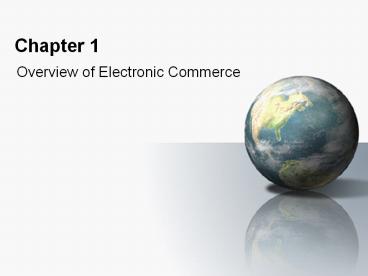Overview of Electronic Commerce - PowerPoint PPT Presentation
Title:
Overview of Electronic Commerce
Description:
Define electronic commerce (EC) and describe its various categories. ... 'Lotus Bowl platter with truffles' EC 2006. Prentice Hall. 6. EC 2006. Prentice Hall. 6 ... – PowerPoint PPT presentation
Number of Views:566
Avg rating:3.0/5.0
Title: Overview of Electronic Commerce
1
Chapter 1
- Overview of Electronic Commerce
2
Learning Objectives
- Define electronic commerce (EC) and describe its
various categories. - Describe and discuss the content and framework of
EC. - Describe the major types of EC transactions,
technologies and interactions. - Describe some EC business models.
- Describe the benefits of EC to organizations,
consumers, and society. - Describe the limitations of EC.
3
Electronic Commerce Definitions and Concepts
- What is electronic commerce (EC)?
- What is e-business?
4
Electronic Commerce Definitions and Concepts
- Pure Versus Partial EC
- EC takes several forms depending on the degree of
digitization (the transformation from physical to
digital) - (1) the product (service) sold,
- (2) the process,
- (3) the delivery agent (or intermediary
- Examples?
5
Electronic Commerce Definitions and Concepts
- EC organizations
- brick-and-mortar organizations
- virtual (pure-play) organizations
- click-and-mortar (click-and-brick) organizations
- Examples?
- Godiva.com
- What type of an organization is Godiva?
- Navigational features of the site exercise
- Lotus Bowl platter with truffles
6
Electronic Commerce Definitions and Concepts
- Where E-business is conducted
- electronic market (e-marketplace)
- interorganizational information systems (IOSs)
- intraorganizational information systems
7
Exhibit 1.2 A Framework for Electronic
Commerce
8
EC Classification Transactions
- Classification by nature of the transactions or
interactions - business-to-business (B2B)
- business-to-consumer (B2C)
- consumer-to-consumer (C2C)
- Examples?
9
EC Classification Technology
- peer-to-peer
- mobile commerce (m-commerce)
- what is location-based commerce (l-commerce)?
- example?
10
EC Classification Type of Interaction
- collaborative commerce (c-commerce)
- what is collaborative commerce?
- example?
- e-learning
11
Electronic Commerce Major Historical Landmarks
- ETF (1970s)
- EDI (1980s), proprietary, expensive
- WWW (1990s)
- .com boom (late 1990s, early 2000s)
- .com bust (2001-2002)
- Google IPO (2004)
12
Digital Evolution Drives EC
- Digital economy
- What are three characteristics of digital
economy? - Digital Convergence
13
Business Environment Drives EC
- Critical Response Activities What companies must
do to survive in competitive business environment
as it changes - Traditional Responses?
- Innovative Responses?
- Categories of business pressures
- market (economic) examples?
- Societal examples?
- Technological examples?
14
Business Environment Drives EC
- Organizational response strategies What
EC-enabled initiatives can organizations and
businesses undertake to deal with those
pressures? - BPR
- CRM
- Business Alliances
- Electronic Markets
- Time to Market Reduction
- Mass Customization
15
EC Business Models
- The Structure of Business Models
- What are the six elements of a comprehensive
business model?
16
EC Business Models
- What are major revenue models?
- Examples?
17
EC Business Models
- Value proposition (to whom?)
- What are some typical EC Business Models?
18
EC Business Models Orbis Group
- Describe Traditional Supply Chain (process) for
product catalog acquisition. - Describe Process with ProductBank.
- What processes are eliminated?
- What players are eliminated?
- Who benefits?
- Who loses?
19
Benefits of EC
Benefits to Organizations
20
Benefits of EC
Benefits to Consumers
21
Benefits of EC
- Benefits to Society
22
Exhibit 1.7 Limitations of EC
- Most prominent technical limitations/barriers?
- Most prominent non-technical limitations/barriers?
- How can we overcome them?
23
Exhibit 1.8 The Networked Organization
24
Summary
- Definition of EC and description of its various
categories. - The content and framework of EC.
- The major types of EC transactions.
- The major EC business models.
- Benefits of EC to organizations, consumers, and
society. - Limitations of EC.

